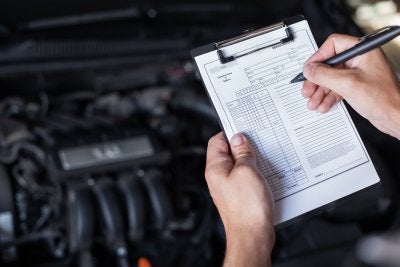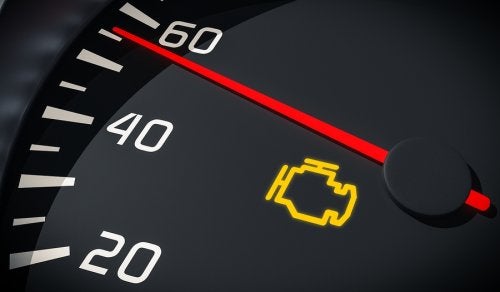-
Reasons to Get a Pre-Purchase Inspection
Purchasing a used car is a savvy investment for any driver. Before you place a down payment on a used German auto, however, you may want to bring the vehicle to an auto mechanic in Sacramento for a pre-purchase inspection. During the pre-purchase inspection, your car repair professional will carefully evaluate the performance, safety, and efficiency of all of the vehicle’s vital systems. To emphasize the benefits of having your used car inspected before you buy, here is a brief overview of 3 reasons to schedule a pre-purchase inspection.

Identify Potential Problems
One of the top reasons to schedule a pre-purchase inspection at Frank’s Automotive for your used vehicle is that the inspection process will allow you to identify any potential problems that may be going wrong underneath the hood. Your mechanic will be able to tell you whether the brakes, coolant lines, or other major systems are going to require major repairs at any time in the near future. If the inspection does not reveal major mechanical problems, you can make your purchase with confidence.
Avoid Buying a Lemon
After you purchase a used car, you will not want to find out about major mechanical issues that were not revealed to you prior to the sale. With a pre-purchase inspection, you can ensure that you are not buying a car that is destined to break down. A qualified mechanic will be familiar with your make and model of car, so he will be able to warn you of any mechanical problems that are common with that type of vehicle.
Receive a Better Price
If the pre-purchase inspection reveals the need for certain mechanical repairs, you may be able to use this information to negotiate a better price for your vehicle. Your mechanic can provide you with an estimate for the cost of repairing the car, and you can relay this information to the seller. Ultimately, your pre-purchase inspection will allow you to get a fair price on a car that is in good mechanical condition.
-
What to Know About Your Car’s Electrical System
Your car is more than a thousand pounds of metal on wheels; it also involves complex automotive electronics in Sacramento to make itself as safe, effective, and convenient as possible. It’s a good idea to familiarize yourself with some of the automotive electrical components that are included in your car; this will also help you identify problems early on. Be sure to talk to your alternator repair specialist for tips on solving electrical problems, and take a look ahead for more on what you should know about your car’s electrical system.

Electrical Components
A vehicle’s electrical system is made up of several components, all of which serve specific purposes and contribute to the overall functioning of your car. In addition to your radio, dashboard camera, and built-in television screens, your automotive electronics consist of systems like the battery, the computer, and the alternator. These components are important when it comes to basic functioning of your car—even getting it started. Your electrical system keeps you and others safe by powering your headlights and your turning signals, while your alternator allows your vehicle to keep moving. Knowing about your automotive electronics and what they do can make you better prepared to notice problems with your electrical system. An important fact about most modern cars, all components from light management to stereo to engine management communicate with each other. With electrical issues, you want to start with the basics.
Common Problems
If you get into your car on a hot day and try to roll your windows down to no avail, there might be a problem with your electronic system. Similarly, having trouble starting your car or issues with your seats and automatic locks can point to automotive electrical problems. You might even notice your headlights dimming or shutting off completely, which can compromise your safety on the road. How you handle these issues can impact the working life of your vehicle and your own wellbeing.
How to Solve Them
It’s always a good idea to talk to a professional when working on your automotive electrical system. You want to make sure your battery and charging systems are in proper functioning order. So it is important to check all systems when looking for electrical gremlins. You might end up doing more harm than good if you try to deal with the problem on your own, so play it safe and see your specialist for professional help.
-
Don’t Ignore Your Check Engine Light
Being in tune with your vehicle means knowing what kinds of problems to look for and what types of signs your car might provide when it’s dealing with an issue. Your check engine light in Sacramento can help alert you to a problem with your car, but it’s your responsibility to talk to your engine repair specialist and get to the bottom of the issue. Check engine lights can indicate a wide array of malfunctions, so you shouldn’t waste any time in looking for a diagnosis. Continue reading to find out why you shouldn’t ignore your check engine light.
The longer you wait to find out what’s making your check engine light illuminate, the more time you will give the problem to develop. Even minor issues can become serious if you don’t address them, but a check engine light could also indicate a significant malfunction. Try looking at your gas cap when you notice your check engine light is on; you might just need to tighten it. If the check engine light stays lit, you could have a problem with your spark plugs, catalytic convertor, or oxygen sensor. Make sure to talk to your mechanic to get these problems sorted out.

-
Symptoms of an Alternator Problem
If you want your vehicle to last as long as possible, it’s helpful to understand what types of problems you should look out for. When you know what to look for, you can call for alternator repair in Sacramento before the problem gets out of control. You might want to call your automotive electrical specialist about alternator repair if you notice strange noises coming from your car. Other symptoms include electrical issues like dimming lights, and problems when starting your vehicle. Read on for a closer look at some of the symptoms of an alternator problem that you should be aware of as a driver.

Odd Sounds
A loud, strange, or unexpected sound tends to surprise people, as it typically indicates that something is out of order. Just like you would investigate an unidentified sound in the middle of the night, you should keep an ear out for odd noises coming from your car. In some cases, your car might be making this sound because you have a problem with your alternator. Make sure you don’t waste any time in bringing your car in to your specialist for alternator repair so you can keep your bearings in place and your car functioning properly.
Electrical Issues
Problems with your automotive electronics may suggest that you need alternator repair, and they can show up in a few different ways. A failing alternator might leave you with dim or flickering headlights, as the alternator is responsible for providing power. An analogy: A vehicle with a charging system problem is like a child’s toy with weak or dying batteries– it may function but it will start to act weirdly. Lights, Radio, Climate Control & even Engine functions can be compromised. You should also pay attention to your power locks and windows, radio, and other automotive electronics in your car. Your battery could even drain due to a malfunctioning alternator, so seek help as soon as you can.
Trouble Starting the Car
When you get into your car and realize that you had left the interior light on all night, you might not be surprised when your car fails to start. If your car is routinely difficult to start, however, you might be having a real problem with your automotive electronics. Even if your battery is working, a failing alternator might not be able to get the power to your engine. However, a lot of times people confuse the vehicles ability to turn on lights in-dash as the battery being okay. The battery maybe strong enough to turn on lights but too weak to crank vehicle over. There is a difference between “Not Starting” & “Not Cranking Over”. If a vehicle cranks over and does not start, there could be another issue rather than the battery or starter. If your key turns over but engine does not crank over, that could be a charging system or starter issue. This is why we recommend a Car Diagnostic to be able to determine where the issues lies.
RECENT POSTS
categories
- Uncategorized
- Automotive
- automotive diagnostics services
- Frank’s Automotive
- auto shop
- oil change
- Auto mechanic
- Maintenance
- maintenance schedule
- Catalytic Converter
- Engine Light
- oxygen sensor
- Transmission Problems
- BMW
- Pre-Purchase
- Brakes
- Anti-Lock Brakes
- Auto Diagnostics
- Alternator Repair
- Slipping Transmission
- Engine Trouble
- Brake Sounds
- Frank’s Automotive
- Frank Lettini
Archives
2022
2020
2019
2017
2016
- December (4)
- November (5)
- October (4)
- September (4)
- August (4)
- July (4)
- June (4)
- May (4)
- April (4)
- March (4)
- February (4)
